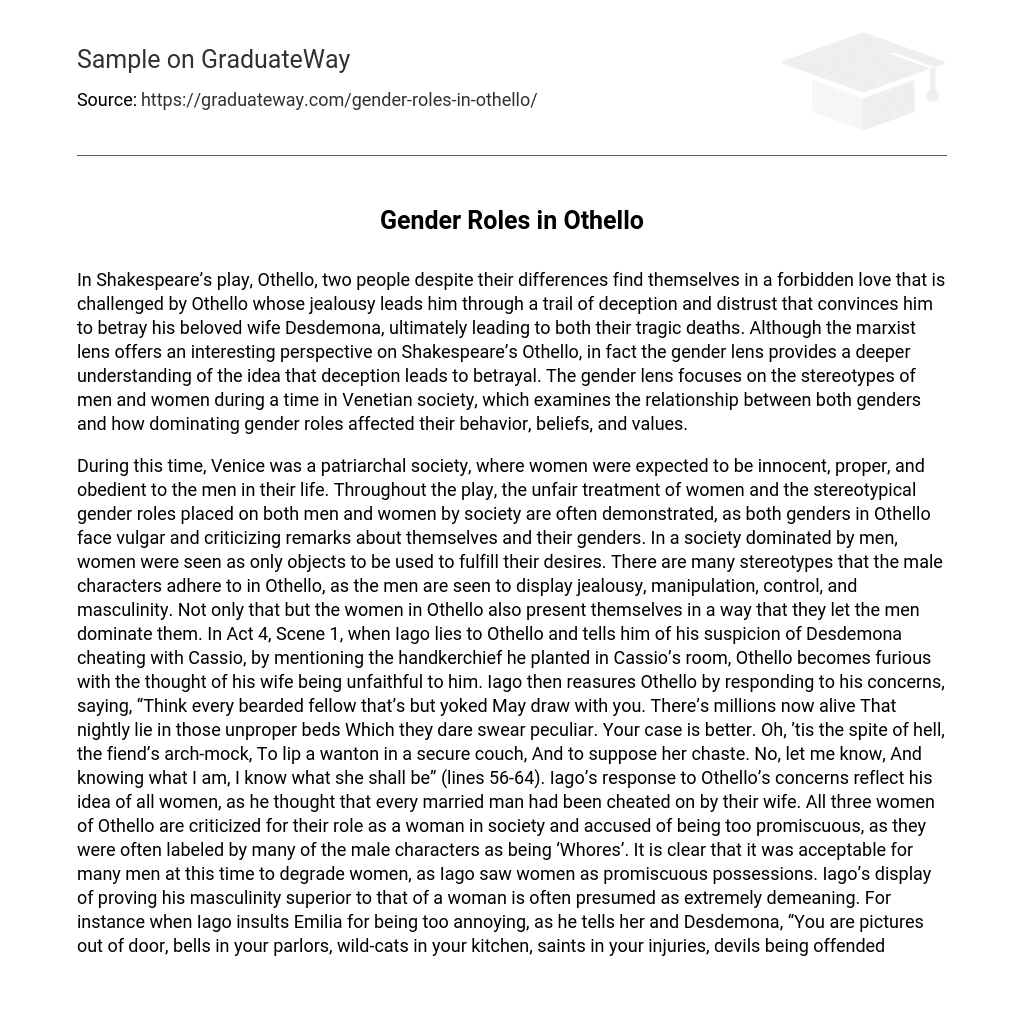In Shakespeare’s play, Othello, two people despite their differences find themselves in a forbidden love that is challenged by Othello whose jealousy leads him through a trail of deception and distrust that convinces him to betray his beloved wife Desdemona, ultimately leading to both their tragic deaths. Although the marxist lens offers an interesting perspective on Shakespeare’s Othello, in fact the gender lens provides a deeper understanding of the idea that deception leads to betrayal. The gender lens focuses on the stereotypes of men and women during a time in Venetian society, which examines the relationship between both genders and how dominating gender roles affected their behavior, beliefs, and values.
During this time, Venice was a patriarchal society, where women were expected to be innocent, proper, and obedient to the men in their life. Throughout the play, the unfair treatment of women and the stereotypical gender roles placed on both men and women by society are often demonstrated, as both genders in Othello face vulgar and criticizing remarks about themselves and their genders. In a society dominated by men, women were seen as only objects to be used to fulfill their desires. There are many stereotypes that the male characters adhere to in Othello, as the men are seen to display jealousy, manipulation, control, and masculinity. Not only that but the women in Othello also present themselves in a way that they let the men dominate them. In Act 4, Scene 1, when Iago lies to Othello and tells him of his suspicion of Desdemona cheating with Cassio, by mentioning the handkerchief he planted in Cassio’s room, Othello becomes furious with the thought of his wife being unfaithful to him. Iago then reasures Othello by responding to his concerns, saying, “Think every bearded fellow that’s but yoked May draw with you. There’s millions now alive That nightly lie in those unproper beds Which they dare swear peculiar. Your case is better. Oh, ’tis the spite of hell, the fiend’s arch-mock, To lip a wanton in a secure couch, And to suppose her chaste. No, let me know, And knowing what I am, I know what she shall be” (lines 56-64). Iago’s response to Othello’s concerns reflect his idea of all women, as he thought that every married man had been cheated on by their wife. All three women of Othello are criticized for their role as a woman in society and accused of being too promiscuous, as they were often labeled by many of the male characters as being ‘Whores’. It is clear that it was acceptable for many men at this time to degrade women, as Iago saw women as promiscuous possessions. Iago’s display of proving his masculinity superior to that of a woman is often presumed as extremely demeaning. For instance when Iago insults Emilia for being too annoying, as he tells her and Desdemona, “You are pictures out of door, bells in your parlors, wild-cats in your kitchen, saints in your injuries, devils being offended, players in your housewifery, and housewives in your beds”(2.1.119-122). Iago claims that women cannot be trusted because they’re all the same in the way they deceive their husbands. This attitude towards women seems to be most considered by the male characters as what they perceive them as disloyal and promiscuously deceiving. With Iago’s vengeful intentions, it was easy for Iago to take advantage of Desdemona and Emilia, and manipulate Othello into believing that Desdemona was an unfaithful wife.
Throughout the play, all the women of Othello are often treated and referred to like property, as many felt like they could not speak their minds and had to be obedient to their husbands and fathers.





